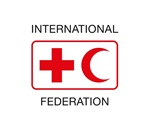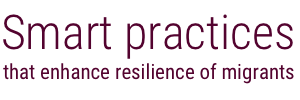Sessions provide migrant workers during their stay in Lebanon with basic information on a range of relevant issues, including how to prevent human trafficking and render migration safe during the whole migratory cycle, as well as how to ensure safe return and reintegration in communities of origin.
In Lebanon, IOM, in cooperation with Caritas, has developed orientation sessions to reinforce the capacities of migrant workers in Lebanon and relevant diasporas. Caritas conducts training sessions with the leaders of migrant communities in Lebanon (‘champions’), who further trained their own communities residing in Lebanon. During the sessions, migrants discuss different aspects including safe recruitment and things to do and to know while working in Lebanon, when deciding to return home, when starting life back home again, or when deciding to migrate again. Topics include: how to avoid traffickers, which options to explore, and what resources and information are available before taking a decision. They also discuss what migrants can expect when they return home. For example their family and community may have very high expectations of them, or they may be shunned because of exploitation they endured abroad. Caritas chose the champions by ensuring that they were not receiving capacity building through other programs. This way they aimed to maximize their capacity building reach across various initiatives. The materials have been made available to other NGOs. These sessions are also provided to victims of trafficking or abuse who are temporarily hosted in shelters. While they are at the shelters, they receive orientation sessions, in addition to psychosocial support, legal assistance, guidance on which institutions can provide support and services, and business training for when they return.
140 migrants have been trained to date; 20 champions have been trained.
Design. [P1] Mitigates migrant vulnerability when they return. [P3] Supports the aspirations of migrants to return home.
Implementation. [P6] Several actors collaborate to deliver the training.
Programme. [P8] Assists returning migrants.
- It is challenging to find a convenient time to gather migrant workers. The outreach process was lengthy but was also a good opportunity for the champions to learn from.
- It is difficult to assess the impact of these sessions especially after migrant workers return, because it is difficult to follow up for feedback.
- In future training of trainers sessions, it will be interesting to reserve time during the session for future champions to develop their own materials based on the discussion.
Smart practices
Smart practices report and database survey
About the report
People migrate in pursuit of a better life for themselves and their families. As described in the International Federation of Red Cross and Red Crescent Societies’ (IFRC) Policy on Migration, “migrants are persons who leave or flee their habitual residence to go to new places – usually abroad – to seek opportunities or safer and better prospects.
Read more
About the International Federation

